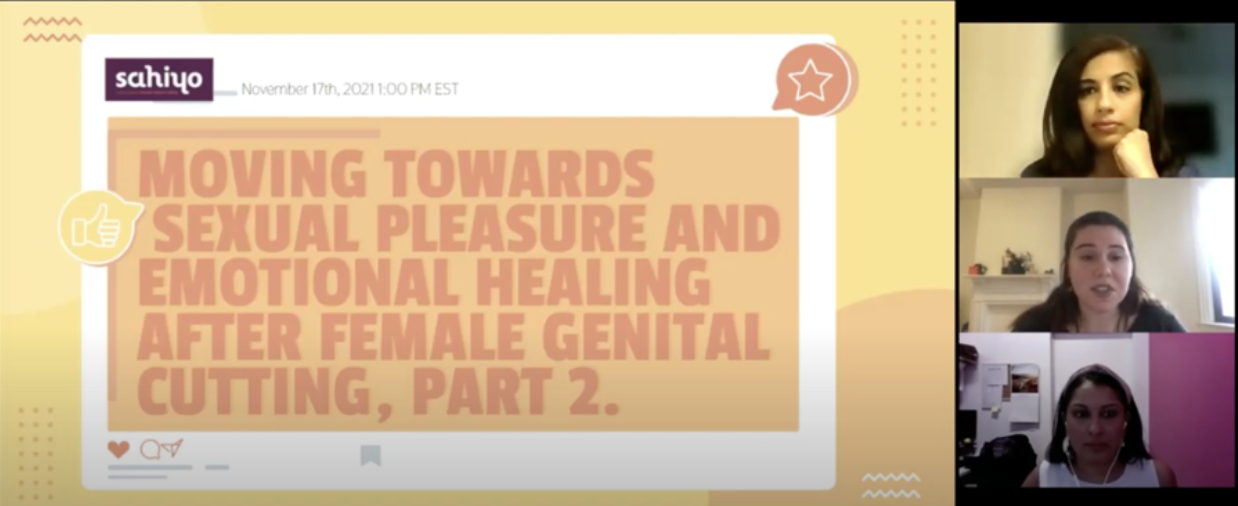On November 17th, Sahiyo hosted part two of the ‘Moving Towards Sexual Pleasure and Emotional Healing After Female Genital Cutting’ webinar. Two specialist speakers helped to lead the webinar: Haddi Ceesey, a health educator on sexual and reproductive health, and Nazneen Vasi, an expert in physical and pelvic floor therapy.
Nazneen began by asking the audience what the pelvic floor is and then explaining it comprises the external female genitalia. I was shocked to realise I wouldn’t have been able to answer if someone had asked me this question. The comprehensive detail that Nazneen went into very effectively emphasised how little we as women are taught about our own bodies. She also emphasized how important it is to understand the workings of the female body to fully appreciate how trauma is physically reflected in the body. Nazneen described how trauma to the pelvis, for example, can present as sexual pain, incontinence, or loss of organ support, which can result in prolapse. Female genital cutting (FGC) specifically can cause pelvic floor dysfunction, which presents as pelvic pain, weakened muscles, and constipation, among other things. It felt very important to learn about such specific consequences of FGC, in order to start grasping the suffering of so many women.
The importance of advocating for our own public health was subsequently expressed, especially as there are so few healthcare practitioners who are trained specifically in the support system of the pelvic floor. It seemed to provide further evidence for the erasure of women in medicine and healthcare; when male bodies are seen as the universal norm, their symptoms and side effects are often automatically applied to all, and their female counterparts’ symptoms and side effects are all too often disregarded. This inequitable norm provides all the more reason to prioritise your own health, especially as a survivor, in order to move forward and reclaim one’s own body. You can read more about Nazneen’s work and Pelvic Floor Therapy in relation to FGC here.
Haddi explored this journey to healing further, discussing general wellbeing and how FGC has been found to directly impact mental health, especially in young people. The physical problems resulting from FGC, such as pregnancy complications, period pains or poor sexual health, inevitably lead to a worsened quality of wellbeing; FGC survivors have often cited anxiety, stress and fear concerning sex and intimacy. When speaking to mothers, Haddi found that their concerns about sex stemmed from a fear of potential complications they would face having more children, based upon their previous difficult childbirths. Interestingly, many of the women surveyed wouldn’t even directly address sex; they would instead talk about marriage and let the rest be inferred.
I thought that this very effectively highlighted a significant part of the problem as to why FGC still occurs – it is inevitably much more difficult to address this gender-based violence if practicing communities see sex and sexuality as a taboo, or as something private or shameful. It makes it a lot harder for survivors to be open about their sexual struggles stemming from FGC, or to get support in overcoming these issues.
Haddi concluded her part of the webinar on a constructive note, focusing on how survivors can move forward in intimate relationships; she suggested increasing conversations about intimacy and pleasure within sexual partnerships, as well as with other survivors. Haddi explained that these women can learn a lot from each other alongside providing support. Additionally, it is clear that there is not nearly enough comprehensive legislation on FGC, and that it must include education and resources to help survivors live healthy and fulfilled reproductive and sexual lives. Finally, Haddi encouraged survivors to spend time with themselves and their partner, to explore their bodies and find different erogenous zones. There are also some very exciting developments currently in clitoral reconstruction and restoration, which specifically puts emphasis on regaining pleasure.
Overall, I found the talk to be very positive and empowering. Both speakers went into important detail about the physical and psychological consequences that FGC can have on sexual and reproductive health, and both gave expert advice and multiple different methods to help survivors start to regain their sexuality.
Watch the full event here.
Read the transcript here.
Watch Moving Towards Sexual Pleasure and Emotional Healing After Female Genital Cutting Part 1 here.

